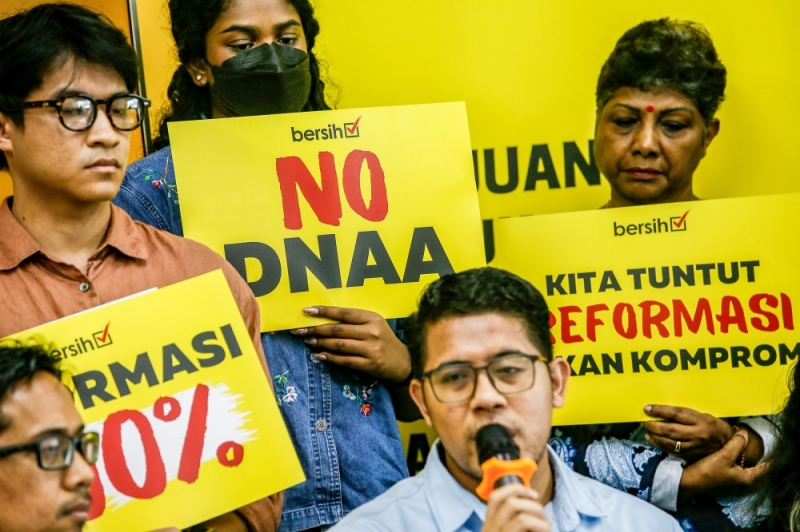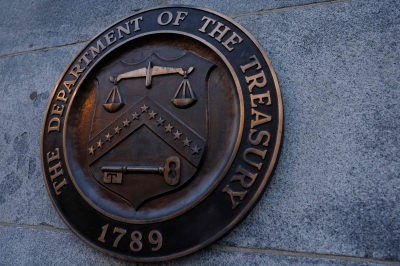
File picture of placards during a Bersih press conference at its headquarters in Petaling Jaya, February 7, 2024. On Saturday, Bersih announced the gathering at Parliament to push the political coalitions in power to deliver on previously promised demands. It previously warned the national unity government that the group could launch another of its mass protests unless there were visible efforts to deliver on reforms previously promised in their election manifestos, including the separation of the attorney general’s functions and the restoration of Parliament’s independence from the executive. — Picture by Hari Anggara.
Join us on our WhatsApp Channel, follow us on Instagram, and receive browser alerts for the latest news you need to know.
By R. Loheswar
Tuesday, 27 Feb 2024 7:00 AM MYT
KUALA LUMPUR, Feb 27 — The slow pace of reforms, opacity in governance, and a notable departure from election promises were the driving factors behind electoral watchdog Bersih’s decision to stage a demonstration outside Parliament today, several analysts said.
Citing concern with the government’s pace in delivering on promises made in manifestos for the 15th general election (GE15), the experts said there was palpable frustration among groups such as Bersih, which has come to a head with the demonstration taking place today.
“One would surmise that they must have caught wind that there would be few or no substantive reform proposals that are likely to come out of this parliamentary seating from their perspective, so they decide to jump the gun and perhaps force the reform agenda upon the government. They were perhaps also worried that they could be pre-empted by, for example, the King’s speech possibly calling for patience and no street protests and such.
“I think among the progressives and reform-minded in this country, there is the heavy feeling that the pace for reform, if any, does not proceed fast enough for their liking, so they would like to vent their frustration in a dramatic albeit peaceful manner,” said Oh Ei Sun a senior fellow at the Singapore Institute of International Affairs.
Advertisement
On Saturday, Bersih announced the gathering at Parliament to push the political coalitions in power to deliver on previously promised demands. It previously warned the national unity government that the group could launch another of its mass protests unless there were visible efforts to deliver on reforms previously promised in their election manifestos, including the separation of the attorney general’s functions and the restoration of Parliament’s independence from the executive.
Bersih chairman Faisal Abdul Aziz said the government had deviated from the reform agenda, following the partial pardon for former prime minister Datuk Seri Najib Razak and Deputy Prime Minister Datuk Seri Ahmad Zahid Hamidi’s discharge not amounting to acquittal (DNAA) in his corruption trial.
Senior Fellow at Nusantara Academy for Strategic Research Azmi Hassan said Bersih’s demonstration could be its way of trying to stay relevant after being dormant the past few years.
Advertisement
He said the electoral watchdog has lost some of its clout compared to its heydays more than a decade ago, and was latching on to the two high-profile cases to remind Malaysians that Bersih still existed.
“I think they’ve lost their mojo and are using the Najib and Zahid cases to raise their profile again. As to their direction when it comes to what the public really want, championing parliamentary reforms is not the way forward in my opinion. They need to change it up a little bit.
“Instead of fighting for that, the public is interested in how to reduce the cost of living. They’d like to force the government to reduce the people’s burden as the cost of goods keeps rising every day. This is the way to go, not by promoting parliamentary reforms as we can see in 15 years, not many reforms have happened and I think they’ve lost their way around as far as what the people are really concerned about,” Azmi said when contacted.
His Majesty Sultan Ibrahim, King of Malaysia, delivered his royal address to open the First Meeting of the Third Session of the 15th Parliament yesterday.
Based on the calendar on Parliament’s official website, the meeting will run until March 27.
Speaking to Malay Mail, Bersih deputy chairman Wong Yan Ke said today’s gathering was not a rally but a march from Plaza Tugu Negara to Parliament to demand that the government take immediate steps to deliver on the overdue reforms.
“It would be good to have at least a timeline or a roadmap on how the reforms they pledged in their manifesto was going to be done. Right now, we only hear things but there’s no proof to back it up. That’s why the short march was to put some pressure on the government to highlight and debate these reform agenda from the offset instead of it being business as usual in Parliament.
“There’s the issue of Najib’s pardon and the double standards being practised that we would like not to happen anymore and we’re also asking for no more DNAA for other politicians. When fighting corruption, the government must be consistent.
“We can’t on one hand investigate Tun Daim Zainuddin, Tun Dr Mahathir Mohamad, his family and cronies while at the same time Najib gets pardoned and Zahid gets a DNAA. We want the government to go back to its manifesto and focus on those reforms they promised.
“In addition, we also want the upcoming appointment process of the Election Commission chairman to be transparent and open,” he told Malay Mail.
Bersih has been under new leadership since December 2023 after the resignation of former chairman Thomas Fann on November 19, citing a “vote of no confidence” from a divided steering committee pulling in opposite directions.
Two candidates vied for the chairmanship, which ultimately Faisal won by a single vote.
Bersih, renowned for its advocacy for clean and fair elections, is now veering back towards its roots of activism, signalling a departure from its more conciliatory role in recent times. Following the pledges made during the last Bersih election, the organisation is recommitting itself to direct action rather than solely acting as mediators or peacekeepers in the political landscape.
This shift marks a significant return to form for Bersih, which had previously taken on a more subdued role after periods of intense activism. The decision to revert to a more assertive stance underscores the mounting frustration within the organisation and the broader civil society regarding the perceived sluggishness in government reforms and lack of accountability for it.

.png) 2 months ago
2 months ago
















 English (US) ·
English (US) ·